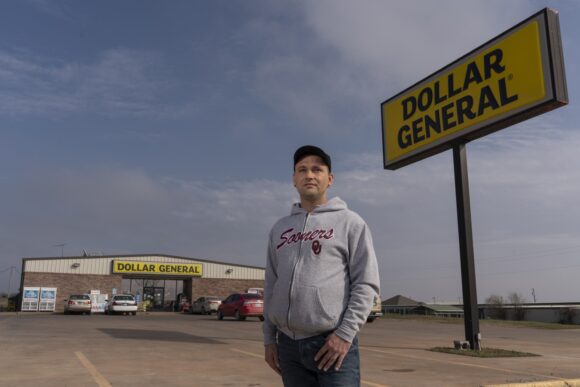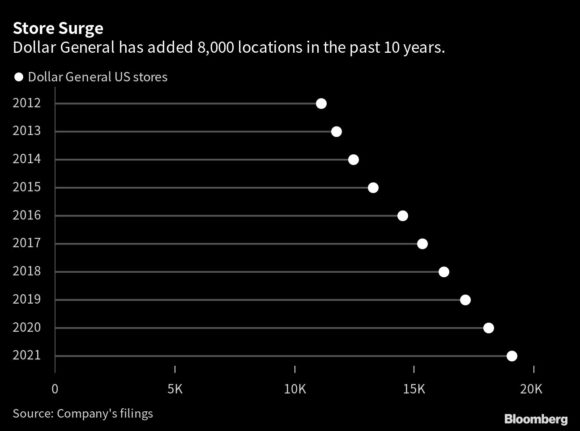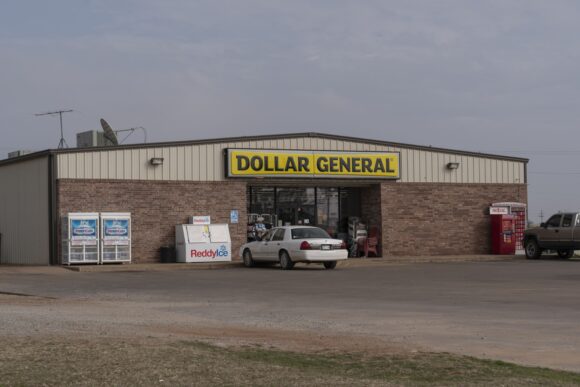Dollar General Corp.’s stores are as ubiquitous in small-town America as Starbucks cafes in cities and suburbia. And just like the coffee giant, it’s facing increasing criticism over worker treatment that could disrupt one of the retail industry’s most successful business models.
When 35-year-old Josh Tinker became store manager of a Dollar General location in 2021 in Apache, Oklahoma, he struggled to recruit workers from the town with a little more than 1,000 residents. Pay of $8 or $9 an hour was a hurdle. And so were the conditions, with leaks in the ceiling and a balky heating and air conditioning system.
“When it was cold, we were wearing five shirts,” said Tinker, who left the company last year and began speaking out against the retailer that has 19,000 US locations — the most in the country.
Management instructed Tinker to use a space heater, but workers could still see their breath during shifts. The summer didn’t offer relief. Then “it was 115 in the store,” said Tinker, who has collaborated with More Perfect Union, a labor-oriented group. “Everything was melting, and we’d put ice packs down our shirts.”

.
Tinker isn’t alone. Other employees are going public. And in October, Dollar General became the only national retailer on the Labor Department’s “severe violator” list of companies with unsafe working conditions. Federal inspectors repeatedly found blocked emergency exits, fire hazards and boxes stacked to the point that they could collapse onto workers.
Over the past two years, the Labor Department’s Occupational Safety and Health Administration has issued fines of $12.5 million against Dollar General, the most of any retailer during that period.
That’s hardly a financial threat — the two-year tally amounts to less than half a percentage point of the company’s net income over the period. Still, OSHA recently expanded its severe violator program to include retailers, and the agency signaled its rising frustration by adding Dollar General. The list, which includes many smaller builders, roofers and manufacturers, is reserved for employers with “willful, repeated” violations that haven’t taken effective steps toward improvement.
Dollar General’s inclusion on the list means that the retailer will face stepped-up scrutiny at a time when the Biden administration has been beefing up OSHA’s inspector corps.
In an emailed response to a detailed list of questions for this story, the Goodlettsville, Tennessee-based company said it’s committed to providing a safe work environment and addressing situations in a timely manner.

US regulators see the issues at Dollar General as systemic, not a few isolated incidents.
“This is an indication of a business model issue,” said Doug Parker, the Labor Department’s assistant secretary for occupational safety and health. “We have had enough experience with this company that we know this is not a function of just a handful of stores. This is a broader problem that’s going to have to be addressed at the C-Suite level, not by local and regional safety directors.”
The company and OSHA are in very early stages of discussing a settlement and remediation plan, according to the New York Times.
Restaurant and retail workers are becoming increasingly emboldened amid a tight labor market. Organizing movements have bubbled up at companies ranging from Amazon to Home Depot. Starbucks had largely been seen as offering better pay and benefits than many peers, but its workers have built one of the industry’s most successful unionization efforts.
Read more: Dollar General hits a gold mine in rural America
A reputation for subpar working conditions can make hiring and retaining hourly workers more difficult and expensive. And while every chain needs to recruit employees, finding an increasing amount of cheap labor is core to Dollar General’s growth.
Lots of big legacy retailers have slowed store openings or are reducing locations to focus on e-commerce. But Dollar General doesn’t have much of an online business. Its growth hinges on opening lots of new stores every year and hiring cheap labor to operate them. That includes adding another 1,000 stores this year. (It already operates more US locations combined than Walmart, Target and Kroger.)
One aspect of Dollar General’s model that could help it with hiring is that it opens stores in small towns overlooked by Walmart and grocery chains – about 80% are located in areas with less than 20,000 people — so there is often less competition for labor.
This kind of store expansion at Dollar General is what investors have come to expect. Over the past five years, sales have surged 61% to $37.8 billion with locations leaping by 4,500. Since the start of 2018, its stock has more than doubled – far surpassing the gains at smaller rival Dollar Tree.
Most of Dollar General’s more than 170,000 workers have shared little in the bounty. About 90% of them earn less than $15 an hour, according to a wage tracker created last year by the Economic Policy Institute, a think tank in Washington that focuses on the needs of lower-income workers. That was the highest percentage in the study, which included Walmart and McDonald’s, but not other dollar chains like Dollar Tree and Family Dollar.
While hard to quantify, crime and violence at dollar stores, which handle more cash than other retail formats, are also a risk to employees. In recent months, a Dollar Tree worker in Ohio was killed with a machete and a Brooklyn employee was shot and wounded.
At Dollar General, a Mississippi cashier was shot and wounded, while an employee in Louisiana was charged with manslaughter after killing an armed robber and a man was shot and killed in a Chicago store. Going back to 2016, at least six Dollar General employees died during robberies, CNN found.
Meanwhile, investors have soured a little on Dollar General, with its stock down about 15% this year while the S&P 500 has gained roughly 3%. The company is trying to win back Wall Street by making a bigger push into food, increasing stores in the suburbs and opening its first location in Mexico. In what could be seen as a positive for workers, the company is also adding $100 million to its budget to beef up staffing.
“This investment will primarily consist of incremental labor hours to support our expectations regarding consistent store standards,” Chief Executive Officer Jeff Owen said earlier this month on an earnings call. It will also enhance the “associate and customer experience.”
© 2023 Bloomberg L.P.
Top Photo: Dollar General is the only national retailer on the US Labor Departments ‘severe violator list. Bloomberg photo.
Was this article valuable?
Here are more articles you may enjoy.


 Portugal Rolls Out $2.9 Billion Aid as Deadly Flooding Spreads
Portugal Rolls Out $2.9 Billion Aid as Deadly Flooding Spreads  Uber Jury Awards $8.5 Million Damages in Sexual Assault Case
Uber Jury Awards $8.5 Million Damages in Sexual Assault Case  Charges Dropped Against ‘Poster Boy’ Contractor Accused of Insurance Fraud
Charges Dropped Against ‘Poster Boy’ Contractor Accused of Insurance Fraud  Elon Musk Alone Can’t Explain Tesla’s Owner Exodus
Elon Musk Alone Can’t Explain Tesla’s Owner Exodus 